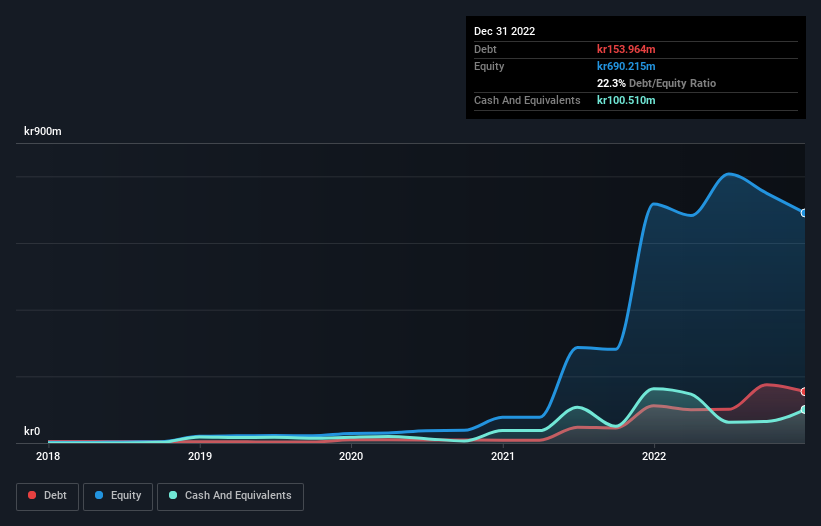The external fund manager backed by Berkshire Hathaway's Charlie Munger, Li Lu, makes no bones about it when he says 'The biggest investment risk is not the volatility of prices, but whether you will suffer a permanent loss of capital.' When we think about how risky a company is, we always like to look at its use of debt, since debt overload can lead to ruin. We note that Zordix AB (publ) (STO:ZORDIX B) does have debt on its balance sheet. But the real question is whether this debt is making the company risky.
When Is Debt A Problem?
Generally speaking, debt only becomes a real problem when a company can't easily pay it off, either by raising capital or with its own cash flow. Ultimately, if the company can't fulfill its legal obligations to repay debt, shareholders could walk away with nothing. However, a more common (but still painful) scenario is that it has to raise new equity capital at a low price, thus permanently diluting shareholders. Having said that, the most common situation is where a company manages its debt reasonably well - and to its own advantage. When we think about a company's use of debt, we first look at cash and debt together.
See our latest analysis for Zordix
How Much Debt Does Zordix Carry?
The image below, which you can click on for greater detail, shows that at December 2022 Zordix had debt of kr154.0m, up from kr111.6m in one year. On the flip side, it has kr100.5m in cash leading to net debt of about kr53.5m.

How Healthy Is Zordix's Balance Sheet?
Zooming in on the latest balance sheet data, we can see that Zordix had liabilities of kr472.3m due within 12 months and liabilities of kr562.6m due beyond that. Offsetting this, it had kr100.5m in cash and kr218.2m in receivables that were due within 12 months. So its liabilities outweigh the sum of its cash and (near-term) receivables by kr716.2m.
When you consider that this deficiency exceeds the company's kr643.0m market capitalization, you might well be inclined to review the balance sheet intently. In the scenario where the company had to clean up its balance sheet quickly, it seems likely shareholders would suffer extensive dilution. There's no doubt that we learn most about debt from the balance sheet. But it is future earnings, more than anything, that will determine Zordix's ability to maintain a healthy balance sheet going forward. So if you're focused on the future you can check out this free report showing analyst profit forecasts.
In the last year Zordix wasn't profitable at an EBIT level, but managed to grow its revenue by 132%, to kr1.2b. So its pretty obvious shareholders are hoping for more growth!
Caveat Emptor
Even though Zordix managed to grow its top line quite deftly, the cold hard truth is that it is losing money on the EBIT line. Indeed, it lost a very considerable kr64m at the EBIT level. When we look at that alongside the significant liabilities, we're not particularly confident about the company. It would need to improve its operations quickly for us to be interested in it. Not least because it burned through kr107m in negative free cash flow over the last year. That means it's on the risky side of things. When analysing debt levels, the balance sheet is the obvious place to start. However, not all investment risk resides within the balance sheet - far from it. For example Zordix has 4 warning signs (and 1 which is a bit unpleasant) we think you should know about.
When all is said and done, sometimes its easier to focus on companies that don't even need debt. Readers can access a list of growth stocks with zero net debt 100% free, right now.
New: Manage All Your Stock Portfolios in One Place
We've created the ultimate portfolio companion for stock investors, and it's free.
• Connect an unlimited number of Portfolios and see your total in one currency
• Be alerted to new Warning Signs or Risks via email or mobile
• Track the Fair Value of your stocks
Have feedback on this article? Concerned about the content? Get in touch with us directly. Alternatively, email editorial-team (at) simplywallst.com.
This article by Simply Wall St is general in nature. We provide commentary based on historical data and analyst forecasts only using an unbiased methodology and our articles are not intended to be financial advice. It does not constitute a recommendation to buy or sell any stock, and does not take account of your objectives, or your financial situation. We aim to bring you long-term focused analysis driven by fundamental data. Note that our analysis may not factor in the latest price-sensitive company announcements or qualitative material. Simply Wall St has no position in any stocks mentioned.
About OM:MAXENT B
Maximum Entertainment
An entertainment company, engages in the development, publishing, transmedia, sale, and operation of video games in North America, Europe, Asia, and internationally.
Mediocre balance sheet with low risk.
Market Insights
Community Narratives



